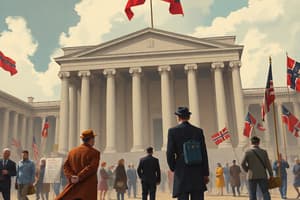Podcast
Questions and Answers
Which political party played a major role in establishing the Weimar Republic?
Which political party played a major role in establishing the Weimar Republic?
- The Communist Party
- The Social Democratic Party (SPD) (correct)
- The National Socialist German Workers' Party (NSDAP)
- The Christian Democratic Union (CDU)
What event marked the beginning of the Weimar Republic's establishment?
What event marked the beginning of the Weimar Republic's establishment?
- The signing of the Treaty of Versailles
- The abdication of Kaiser Wilhelm II
- The proclamation of the republic in November 1918 (correct)
- The convening of the National Assembly in Weimar
What was the main goal of the Spartacists during the early years of the Weimar Republic?
What was the main goal of the Spartacists during the early years of the Weimar Republic?
- To establish a socialist state (correct)
- To renegotiate the Treaty of Versailles
- To restore the German monarchy
- To create a powerful authoritarian government
What did Article 48 of the Weimar Constitution allow the President to do?
What did Article 48 of the Weimar Constitution allow the President to do?
What was a major problem caused by the Treaty of Versailles for the Weimar Republic?
What was a major problem caused by the Treaty of Versailles for the Weimar Republic?
What was the Freikorps?
What was the Freikorps?
Why was the Weimar Republic called the Weimar Republic?
Why was the Weimar Republic called the Weimar Republic?
What was the main difference between the right-wing and left-wing opposition to the Weimar Republic?
What was the main difference between the right-wing and left-wing opposition to the Weimar Republic?
What was the main reason for the widespread resentment in Germany after World War I?
What was the main reason for the widespread resentment in Germany after World War I?
What was the primary contributor to hyperinflation in Germany during the 1920s?
What was the primary contributor to hyperinflation in Germany during the 1920s?
What was the impact of the economic difficulties faced by the Weimar Republic?
What was the impact of the economic difficulties faced by the Weimar Republic?
Why was the Weimar Republic considered weak in terms of its democratic institutions?
Why was the Weimar Republic considered weak in terms of its democratic institutions?
What was the significance of the Beer Hall Putsch in 1923?
What was the significance of the Beer Hall Putsch in 1923?
How did extremist groups contribute to the decline of the Weimar Republic?
How did extremist groups contribute to the decline of the Weimar Republic?
What event significantly weakened the Weimar Republic in the early 1930s?
What event significantly weakened the Weimar Republic in the early 1930s?
What ultimately led to the end of the Weimar Republic?
What ultimately led to the end of the Weimar Republic?
Flashcards
Weimar Republic
Weimar Republic
The democratic government established in Germany post-World War I, lasting from 1919 to 1933.
End of WWI
End of WWI
The defeat of Germany in 1918, leading to the collapse of the monarchy and creation of the Weimar Republic.
Treaty of Versailles
Treaty of Versailles
The 1919 agreement that ended WWI, imposing heavy penalties on Germany, including reparations.
Social Democratic Party (SPD)
Social Democratic Party (SPD)
Signup and view all the flashcards
Weimar Constitution
Weimar Constitution
Signup and view all the flashcards
Political Instability
Political Instability
Signup and view all the flashcards
Freikorps
Freikorps
Signup and view all the flashcards
Spartacists
Spartacists
Signup and view all the flashcards
Diktat
Diktat
Signup and view all the flashcards
Hyperinflation of 1923
Hyperinflation of 1923
Signup and view all the flashcards
Unemployment and poverty
Unemployment and poverty
Signup and view all the flashcards
Weakness of democratic institutions
Weakness of democratic institutions
Signup and view all the flashcards
Rise of extremist groups
Rise of extremist groups
Signup and view all the flashcards
Beer Hall Putsch
Beer Hall Putsch
Signup and view all the flashcards
Great Depression impact
Great Depression impact
Signup and view all the flashcards
Study Notes
Weimar Republic Establishment
- Established in Germany after WWI's end.
- Replaced the German Empire with a democratic government.
- Lasted from 1919 to 1933.
- Marked a significant transition in German political landscape.
Weimar Republic: Early Problems
-
Political Instability:
- Opposition from extreme right-wing (e.g., Freikorps) and extreme left-wing (e.g., Spartacists) groups.
- Freikorps resented the Treaty of Versailles, wanted a strong, authoritarian government.
- Spartacists wanted socialist state; attempted uprising in 1919, suppressed by the government.
-
Treaty of Versailles Impact:
- Imposed heavy reparations and territorial losses on Germany.
- Created massive resentment, seen as a humiliating "Diktat".
- Disarmament clauses weakened German military and economy. Loss of territories significant.
-
Economic Crisis:
- Faced hyperinflation (1923) due to reparations and printing money.
- Prices soared, middle class savings destroyed.
- Economic crisis made Weimar government less popular.
- French and Belgian occupation of Ruhr Valley in 1923 worsened economic situation.
- High unemployment and widespread poverty.
- Faced hyperinflation (1923) due to reparations and printing money.
-
Weaknesses of Democratic Institutions:
- Coalition government lacked consensus, lead to political instability .
- Lack of widespread trust in democratic institutions.
- Extremist political groups (Nazis, Communists) gained influence.
-
Rise of Extremist Groups:
- Nazi Party, led by Adolf Hitler, used violence and propaganda, attempted to overthrow government (Beer Hall Putsch, 1923).
- Communist parties used similar methods to undermine the Republic.
Studying That Suits You
Use AI to generate personalized quizzes and flashcards to suit your learning preferences.




